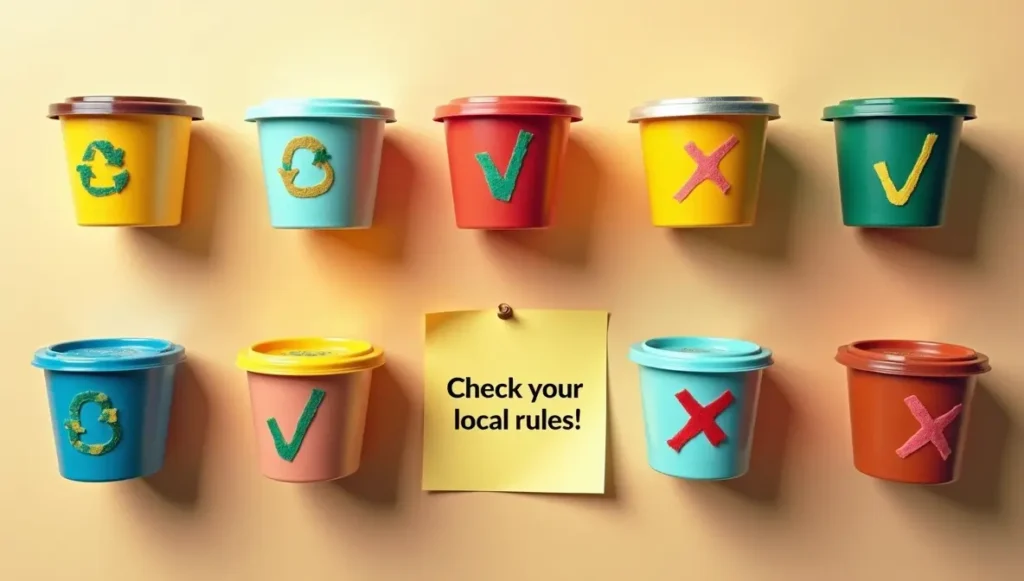You rinse, sort, and recycle—doing your part for the planet. But shockingly, many ‘recyclable’ items still end up in landfills. Why? Hidden rules and tiny mistakes. Here are 7 everyday items you’re recycling wrong, and how to fix them in 2025.
1. Pizza Boxes: The Greasy Trap
The Problem:
Grease soaks into cardboard fibers. Even a small stain can ruin a whole batch of paper recycling. Most facilities toss contaminated loads straight to landfills.
How to Recycle Right:
- Tear off the clean top half (recycle this).
- Compost the greasy bottom. No compost bin? Try:
- Local drop-offs
- DIY compost in your backyard (See our related post)
Did You Know?
A single greasy pizza box can contaminate 10 lbs of clean paper recycling.
2. Coffee Pods: Tiny but Deadly

The Problem:
Most recycling plants can’t process items smaller than a credit card. Pods jam machinery, causing costly shutdowns. Even ‘green’ pods often end up trashed.
2025 Solutions:
- Switch to reusable pods (saves money too!).
- For disposable pods:
- Use Terracycle’s free mail-in program
- Check if your local Starbucks accepts used pods
Pro Tip:
Aluminum pods? These can be recycled—but only if completely clean.
3. Bubble Wrap: The Silent Killer
Why It Fails:
This sticky material wraps around sorting equipment. Workers must stop machines to cut it away—then throw it in the trash.
Better Options:
- Reuse it 10+ times for shipping.
- Find specialty drop-offs via Earth911.
- Try alternatives like crumpled paper or air pillows.
4. “Compostable” Plastics: The Deceptive Label
The Problem:
Most “compostable” plastics only break down in industrial facilities (not your backyard). Tossed in home compost or recycling? They contaminate both streams.
2025 Fixes:
- Look for BPI-certified labels (industrial compostable).
- Never mix with regular recycling—check local compost drop-offs.
- Better yet: Opt for truly zero-waste alternatives (e.g., beeswax wraps, silicone lids).
Shocker Stat:
Less than 15% of U.S. composting facilities accept “compostable” plastics.
5. Toothpaste Tubes: The Squeeze on Recycling
Why They’re Trashed:
Multi-layered materials (plastic + aluminum) can’t be separated at standard plants. Even “recyclable” tubes often lack local processing.
How to Recycle Right:
- Colgate’s TerraCycle program: Free mail-in for any brand.
- Switch to: Toothpaste tablets or metal tubes.
Pro Tip:
Cut open and rinse tubes thoroughly—leftover paste contaminates batches.
6. Receipts: The Thermal Paper Trap
The Hidden Issue:
Most receipts contain BPA/BPS (toxic chemicals) and coat recycling pulp with slippery residue. Many cities ban them from paper bins.
Smart Solutions:
- Opt for digital receipts (stores like CVS and Target offer this).
- If you must keep paper: Store separately (don’t recycle)—or use for scratch notes.
Did You Know?
A single thermal receipt can contaminate a ton of clean paper recycling.
7. “Recyclable” Coffee Cups: The Plastic Lining Lie
The Reality:
The paper shell seems eco-friendly, but the plastic lining (for heat resistance) requires specialty processing. Less than 1% of U.S. facilities can handle them.
What to Do Instead:
- Reuse: Bring your own tumbler (many cafes offer discounts!).
- Terracycle’s Coffee Cup Brigade: Paid mail-in program for hard-to-recycle cups.
Final Tip:
Peel the cup’s sleeve? That part is recyclable (if clean and dry).
Conclusion: Small Changes, Big Impact
Recycling rules change fast—what was “green” in 2020 may now be landfill-bound. Stay ahead in 2025:
🤷♂️When in doubt, throw it out (contamination hurts more than landfill waste).
📓Follow local guidelines (check Earth911’s updated database).
✅Reduce first: The only “perfect” recyclable is the one you don’t need.
